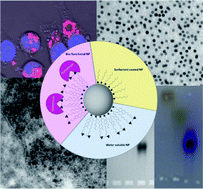Polymer coated inorganic nanoparticles: tailoring the nanocrystal surface for designing nanoprobes with biological implications†
Abstract
The use of inorganic nanoparticles in biomedicine, in particular in the field of diagnosis and therapy of human diseases, has rapidly grown in the last few decades. Water solubilisation of the nanoparticles, especially for particles synthesized in non-polar solvents, is an essential prerequisite for their biological exploitation. The encapsulation of surfactant coated nanoparticles into polymer shells represents one of the most suitable and most popular methods to make them water soluble. Herein we provide an overview of the amphiphilic polymer molecules used and the efforts undertaken to further tailor the surface of polymer coated nanoparticles with fluorescent dyes, chemical sensor molecules and small or large biomolecules for the preparation of bio-functional nanoprobes. Their biological implications, highlighting limitations and challenges, are also discussed.


 Please wait while we load your content...
Please wait while we load your content...